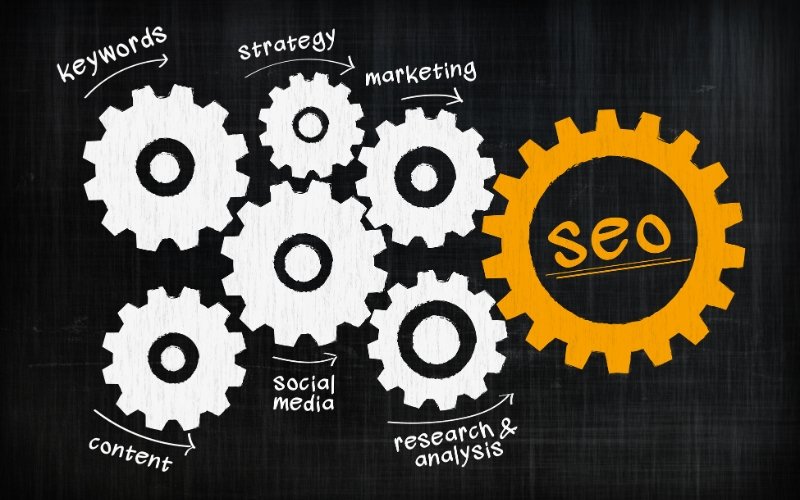In the world of digital marketing, search engine optimization (SEO) is vital to helping websites rank higher in search engine results pages (SERPs). While on-page SEO focuses on optimizing elements within your website, off-page SEO revolves around factors that occur outside your website but still affect its ranking potential. These factors are centered around building authority, credibility, and trust for your website in the eyes of search engines and users. For small businesses, mastering off-page SEO is essential to gaining a competitive edge and growing their online presence. In this article, we’ll explore what off-page SEO is, its key elements, and how small businesses can build authority and trust to improve their rankings.
What Is Off-Page SEO?

Off-page SEO refers to all the activities that happen outside of your website that help influence your website’s search engine rankings. While on-page SEO is about optimizing content and technical factors within your site, off-page SEO focuses on building your website’s authority and relevance through backlinks, social signals, brand mentions, and other external efforts. The goal of off-page SEO is to show search engines that your website is credible, trustworthy, and valuable within your industry or niche.
Off-page SEO plays a critical role in how search engines like Google determine the authority of a website. Websites that have a strong off-page SEO profile, which includes quality backlinks and mentions from authoritative sources, are considered more credible and tend to rank higher than websites with weaker profiles. Ultimately, off-page SEO is about building trust with search engines, and when done effectively, it can lead to long-term benefits such as higher rankings, more traffic, and increased brand visibility.
Key Components of Off-Page SEO

Several key elements contribute to off-page SEO. The most influential of these are backlinks, social signals, online reviews, and brand mentions. Each of these factors helps establish your website’s credibility and authority.
Backlinks (Link Building):
Backlinks are one of the most important ranking factors in off-page SEO. A backlink is a hyperlink from one website to another, and search engines view backlinks as a vote of confidence from one site to another. When authoritative and trustworthy websites link to your website, it signals to search engines that your content is valuable and credible. The more high-quality backlinks you have, the more likely your website is to rank higher in search results.
However, not all backlinks are created equal. Backlinks from reputable and relevant websites carry much more weight than links from low-quality or spammy sites. For small businesses, building backlinks from trusted sources, such as industry blogs, news sites, or influencers, can significantly improve SEO performance. Link-building strategies include guest blogging, collaborating with industry partners, reaching out to influencers, and getting mentioned in authoritative publications.
Additionally, internal linking within your website can also enhance SEO, but backlinks from external websites have a more powerful effect on improving rankings.
Social Signals:
Social media activity indirectly influences off-page SEO by driving traffic to your website and increasing brand exposure. While social signals like shares, likes, and comments don’t directly affect rankings in the same way that backlinks do, a strong social media presence can contribute to SEO success by increasing your site’s visibility and engagement.
For small businesses, leveraging platforms like Facebook, Twitter, Instagram, and LinkedIn can help drive traffic to your website, build brand recognition, and generate buzz around your content. Sharing your content on social media also increases the likelihood that other websites will link to it, further strengthening your backlink profile.
Consistent engagement on social platforms helps establish your brand’s authority within your niche, which can indirectly influence your SEO efforts. Encouraging user interaction and creating shareable content can expand your reach and drive organic traffic.
Online Reviews and Reputation Management:
For local businesses, online reviews play a crucial role in off-page SEO. Positive reviews on platforms like Google My Business, Yelp, and industry-specific review sites can increase your visibility in local search results. Additionally, reviews build trust with potential customers and provide social proof that your business offers value and quality.
Managing your online reputation by responding to reviews, addressing customer concerns, and encouraging satisfied customers to leave positive feedback can improve your local SEO rankings. Search engines view businesses with a high volume of positive reviews as more credible and trustworthy, which can boost their rankings in local searches.
Reviews can also serve as an opportunity to incorporate relevant keywords. For example, if many customers mention your products or services in their reviews, it can increase the relevance of your business for specific search terms, further improving your SEO.
Brand Mentions:
A brand mention is when your business is referenced or mentioned online, either with or without a link. While linked brand mentions (backlinks) are more valuable for SEO, unlinked brand mentions can still have a positive impact. Search engines can track brand mentions and use them as a signal of authority and relevance, even if the mention doesn’t include a hyperlink.
Building your brand’s reputation and encouraging others to mention your business online can help improve your off-page SEO. This can be achieved by collaborating with influencers, participating in industry discussions, or contributing valuable insights to forums and communities. Being visible in your industry and earning mentions from respected sources helps build credibility with both search engines and potential customers.
How to Build Authority and Trust Through Off-Page SEO

Now that we understand the key elements of off-page SEO, let’s look at how small businesses can build authority and trust to enhance their SEO efforts.
Focus on Quality Link Building:
The key to effective link building is quality, not quantity. Building relationships with authoritative websites in your industry and earning backlinks from them should be your primary goal. Avoid low-quality or paid backlinks, as these can result in penalties from search engines. Instead, focus on creating valuable content that other websites will want to link to naturally.
Leverage Local SEO and Reviews:
Small businesses, especially those with a physical presence, should prioritize local SEO. This involves optimizing your website for local search terms and encouraging satisfied customers to leave positive reviews on platforms like Google My Business. Having a strong local SEO profile can help your business appear in “near me” searches and improve your overall online reputation.
Engage on Social Media:
Build a strong social media presence by sharing valuable content, engaging with your audience, and encouraging social sharing. By increasing your brand’s visibility on social platforms, you’ll drive more traffic to your site, improve brand recognition, and potentially attract backlinks from other websites.
Monitor and Manage Your Online Reputation:
Actively monitor your brand’s online presence and reputation by responding to reviews and addressing any negative feedback promptly. Maintaining a positive online reputation is essential for building trust with both search engines and potential customers.
Conclusion
Off-page SEO is a powerful tool for building authority and trust, both of which are essential for improving your website’s search engine rankings. For small businesses, focusing on quality backlinks, leveraging social signals, managing online reviews, and earning brand mentions can significantly enhance SEO performance. By investing time and effort into these off-page strategies, small businesses can establish themselves as credible, trustworthy, and valuable within their industries, driving long-term success in the digital marketplace

